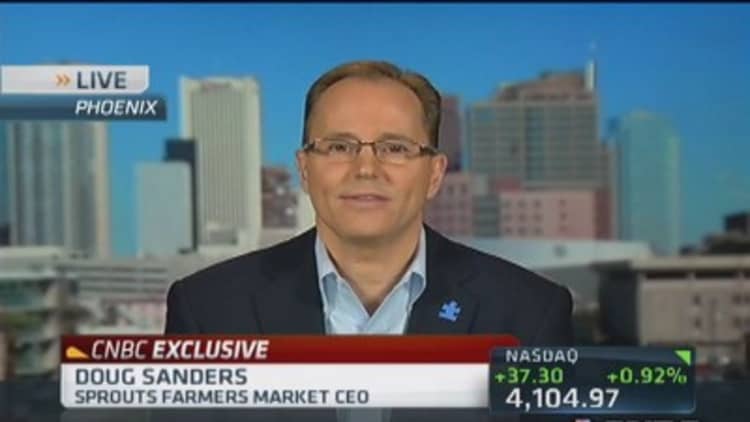Organic food sales rose 11 percent in 2014, to $35.9 billion, and industry forecasters expect a 14 percent compound annual growth rate through 2018. (Tweet This)
That is growth to give any Earth Day observer a lift. But do you really need to pay a premium and go organic, or can you get all the health benefits you want from standard fare?
As with most things food related, experts say the importance of organic food depends: It's about why you are choosing it, whom you are feeding, where it comes from—and how much of a premium you are willing to pay.

Many people choose to eat organic for health reasons, but one of the more divisive issues around organic foods involves their vitamin content. A 2012 meta–analysis of numerous studies by researchers at Stanford found little or no difference in the vitamin counts of organic and traditional foods, and essentially no difference in protein or fat content.
But a different meta–analysis found that organic foods have more antioxidants, among other attributes. Other researchers have reached related conclusions in their own analyses and criticized the Stanford researchers' methodology.
On another health measure, the amount of pesticides in food, organics appear to have a clear advantage. A study published earlier this year in the journal Environmental Health Perspectives found that people consume fewer organophosphate pesticides when they eat organic food than when they don't. And research by the American Academy of Pediatrics found that while organic foods have the same vitamin and mineral content as conventional foods, "they also have lower pesticide levels, which may be significant for children." Even the Stanford study that raised questions about organics' vitamin content noted that consuming organic foods can reduce your risk of exposure to pesticides.
Animals raised organically are also likely to contain less drug–resistant bacteria. Researchers studying large scale chicken farms found that transitioning to organic practices reduced the prevalence of drug resistant bacteria.
"I always recommend organics whenever possible. They are produced using methods that are kinder to soil and animals," said Marion Nestle, a professor in the department of nutrition, food studies and public health at New York University.
The importance of buying organic also depends on who is eating it. For example, children may see an outsized benefit from the reduced exposure to pesticides. The American Academy of Pediatrics studied pesticide exposure in children and found that "children encounter pesticides daily and have unique susceptibilities to their potential toxicity." In particular, the academy said, "Epidemiologic evidence demonstrates associations between early life exposure to pesticides and pediatric cancers, decreased cognitive function, and behavioral problems."
Clearly, organic foods seem to offer benefits conventional food does not, but organic can be pricy. Consumer Reports compared prices on organic and conventional versions of 100 foods and found that on average, organics cost 47 percent more. But the price differences varied widely, and in some cases, organic was actually cheaper. (Tweet This)
Organic zucchini cost $3.99 a pound at Fresh Direct, more than four times the 99 cents Fresh Direct charged for conventional zucchini. But organic maple syrup was cheaper than regular at Peapod, Price Chopper and Whole Foods. Shopping around makes a huge difference in what you will pay for organic food.
If shopping around still leaves your grocery bill too high, you can get strategic about organic foods and shell out for the ones that help you avoid the most pesticides. Dr. Andrew Weil has researched which foods contain high and low levels of pesticides, and the lists he published suggest some spending priorities. (Think apples, celery and blueberries.)
There is also the option of going local. Many small farmers make little or no use of pesticides, even though they may not go through the formal process of becoming certified as an organic farm.
Anthony Vacchiano, a farmer in Warren, New Jersey, practices integrated pest management, an environmentally sensitive pest management approach, with the help of an official from Rutgers University who starts visiting the farm twice a week during the growing season. "If a farmer 10 miles west of me has some kind of blight coming on, he can give me a heads up. He doesn't want me to spray unorganic compounds," Vacchiano said.
Read MoreBuy this natural stock with tons of organic growth
Vacchiano's farming roots go deep–"back to the Roman times," he said, alluding to his Italian agriculturist ancestors. And he firmly believes that simple methods of farming are best. The animals on the farm "are out on pasture all the time," he said. "They are on grass." As for treating whatever bugs and bacteria do creep in, Vacchiano opts for organic substances. "Simple is just easier and more profitable," he said. "These man-made sprays are super expensive."
Conventional food is easy to find, and often it is better priced than organic or locally produced food. But for consumers worried about pesticides and bacteria, the price tag is not the only cost to consider.


